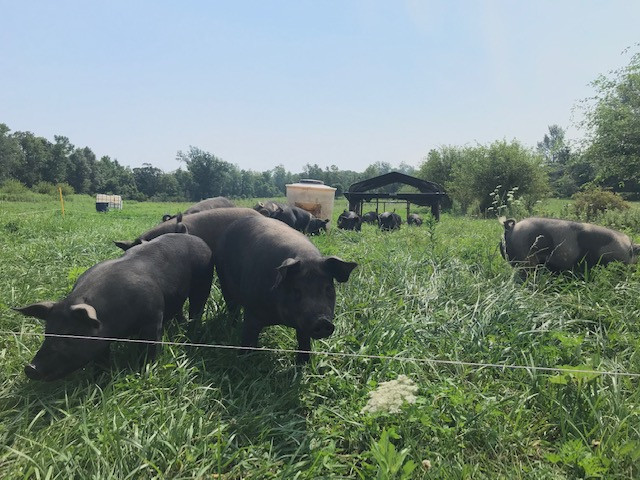RFID update
posted on
August 28, 2024

There is no denying that there are forces at work in this nation (and elsewhere I’m sure) to control the food supply, first in quality and probably eventually in quantity.
One of the strategies being employed is eliminating smaller local farmers by various methods. What I’m bringing to your attention again today is the proposed mandatory RFID (radio frequency identification) tags for cattle and bison.
We are members of and subscribe to the Farm to Consumer Legal Defense Fund (FTCLDF). A few days ago they sent out an email update on this subject with important steps we can take to defend food freedom.
Mandatory RFID tagging, in addition to creating more government control and oversight of every cattle and bison farm, will put a heavy (unmanageable in some cases?) financial burden on smaller operations. And favor large, vertically integrated operations, if you can imagine that.
Not only does this threaten the existence of more small farms than ever, but it also works toward diminishing your food freedoms.
In this week’s email, I am going to share the content of FTCLDF’s recent email update, found below.

As you are probably following, Farm-to-Consumer Legal Defense Fund has been opposing the new USDA rule that requires mandatory visual and electronic identification of any cattle or bison that cross state lines.
The timing is now critical: Next week, the U.S. House of Representatives will vote on funding for the USDA - and we have an opportunity to stop USDA’s new rule mandating electronic ID for cattle!
Mandatory electronic Animal ID is a solution in search of a problem, and one that will harm thousands of small farmers and ranchers across the country.
The solution is simple: Keep the 2013 Animal Disease Traceability Rule unchanged, allowing farmers and ranchers to identify their animal with traditional, low-tech forms of ID or electronic ID, depending on which works best for their operations.
Representative Hageman's Amendment 10 to the Agriculture Appropriations Bill would stop USDA from implementing the new electronic ID mandate by cutting off the use of any funds for it. We urge you to take immediate action and voice your opposition to electronic animal ID mandates!
TAKE ACTION
Action Step #1
Call your U.S. Representative and urge them to vote YES on Representative Hageman’s Amendment 10 to block the USDA’s new rule!
Sample Script
“Hi, my name is ___ and I live in [town]. I am calling to ask my Representative to vote YES on Amendment 10 to the Agricultural Appropriations bill to block USDA’s new rule mandating electronic animal ID.
I am concerned about this issue because [I am a rancher who relies on traditional metal tags; I am a small farmer in an isolated area without good access to tagging equipment; I am a consumer who wants to support local farmers, not international meatpackers; I have privacy concerns; the regulation disproportionately hurts smaller operations…]
[Whatever it is, in a sentence or two, let them know why you are calling about this. You can add talking points from below, if you like - but the most important part is your story as a constituent!]
Action Step #2
2. Spread the word: Share this information with your friends, family, and fellow farmers. Encourage them to also call their U.S. Representatives and voice their opposition to the mandate and their support for Rep. Hageman. Your action is vital to protect small farmers and ranchers and all those who depend on them for their food.
Action Step #3
Keep informed! FTCLDF will continue to follow and report on this matter. For more information and background on RFID tags CLICK HERE.
TALKING POINTS
- The cost of RFID tags disproportionately burdens small and medium sized independent farmers and ranchers.
- The USDA rule allows large, corporate-owned herds to be grouped and tagged as one group, creating a huge loophole that keeps costs low for the companies.
- Although USDA claims the rule is about animal health, it does nothing to prevent or treat disease. USDA hasn’t provided any data to show how it will significantly increase traceback – the agency simply assumes electronic systems will be faster, even though the experience in other countries, such as Australia, does not support this.
- USDA’s press release focused on the real driver for electronic ID, namely greasing the wheels of the export market. This benefits the big companies, while putting the cost on the farmers.
- RFID tags on the live cattle do nothing to increase food safety.
- Mandating electronic ID hurts small farms and ranches and increases consolidation, based on the actual experience in our country.
In good health,
Alexia Kulwiec
Executive Director, FTCLDF
************************************************************************************************************************************
At Farm Connection we are passionate about providing folks with nutritious foods that can heal and help you live your most vibrant life. And we are so grateful to you for supporting local farms and businesses, allowing us to keep doing what we’re doing!
Thanks for using your voice to stand for liberty. Don’t forget to pass this on to your friends and family so they can let their voices be heard too. :)
~Kate






